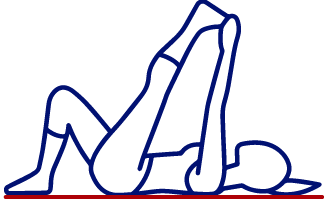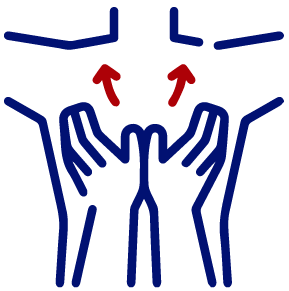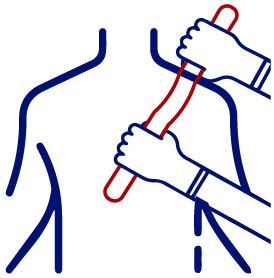
What Is Frozen Shoulder Or Adhesive Capsulitis?
Frozen shoulder occurs when the shoulder capsule, the connective tissue surrounding the shoulder joint, becomes inflamed and tight. This leads to the development of scar tissue, causing the shoulder joint to become stiff and difficult to move.
What Are The Symptoms?
Recognizing the symptoms of frozen shoulder is crucial for understanding and addressing underlying issues. Here’s an overview of common symptoms associated with this condition:

Pain
Persistent, aching pain in the shoulder, especially during movement.

Stiffness
Gradual loss of range of motion in the shoulder.
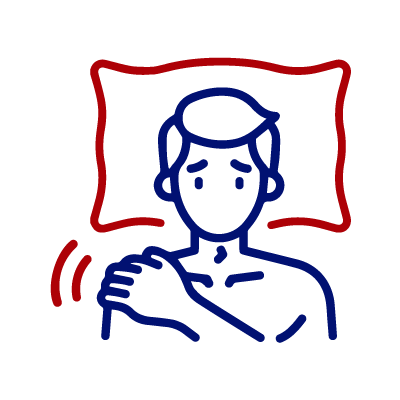
Difficulty Sleeping
Discomfort may make it challenging to find a comfortable sleeping position.
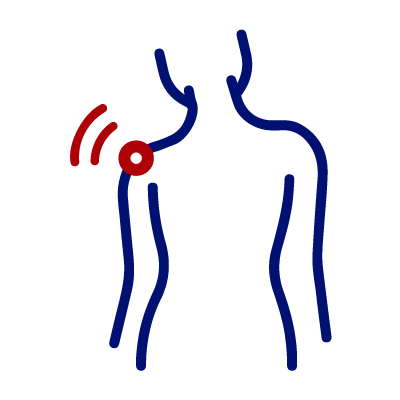
Weakness
Weakened muscles around the shoulder due to lack of use.
Causes And Risk Factors
What Are The Causes?
The exact cause of frozen shoulder is not always clear, but several factors may contribute:
- Inflammation: Inflammation of the shoulder joint can lead to the development of scar tissue.
- Immobilization: Prolonged immobility or reduced movement of the shoulder.
- Other Health Conditions: Diabetes, cardiovascular disease, and thyroid disorders may increase the risk.
What Are The Risk Factors?
Recognizing frozen shoulder risk factors is crucial for preemptive measures, determining the likelihood of shoulder mobility and discomfort issues.
- Age And Gender: Frozen shoulder most commonly affects people between the ages of 40 and 65. Additionally, women are more likely to develop frozen shoulders than men.
- Family History: Frozen shoulder may run in families, suggesting that there may be a genetic component to the condition.
- Shoulder Injury Or Surgery: Shoulder injury or surgery can increase the risk of a frozen shoulder, especially if the shoulder is immobilized for a long period of time.
- Shoulder Immobility: Any condition that causes prolonged immobilization of the shoulder can cause the shoulder capsule to thicken and tighten, increasing the risk of a frozen shoulder.
- Underlying Medical Conditions: Certain medical conditions, such as inflammatory and systemic diseases, are associated with an increased risk of frozen shoulder.
How Is Frozen Shoulder Diagnosed?
To diagnose a frozen shoulder, we collect key details about symptoms, lifestyle, and past shoulder injuries. A thorough physical examination then assesses various aspects of shoulder function, with orthopedic tests for range of motion and flexibility.
- Apley Scratch Test: Evaluates range of motion and flexibility.
- Neer Impingement Test: Assesses for impingement of the shoulder tendons.
- Hawkins-Kennedy Test: Checks for impingement and inflammation in the shoulder joint.
- Motion Analysis: Range of motion assessment
To further validate the findings from the physical examination, diagnostic imaging is often employed to provide a more in-depth view of the shoulder structures
- X-rays: It can reveal any abnormalities in the bones of the shoulder joint, ruling out issues such as fractures or arthritis.
- Magnetic Resonance Imaging (MRI): An MRI can provide detailed images of the soft tissues, including the ligaments and tendons around the shoulder joint.
- Ultrasound: Ultrasound imaging can be used to visualize the structures within the shoulder joint, including the synovium and tendons.
Finally, in the differential diagnosis process, adhesive capsulitis is frequently identified by excluding other potential causes, ensuring a more accurate and comprehensive diagnostic approach.

How Can We Treat Frozen Shoulder
Schedule Your Appointment Today
Contact us today to book a free 15-minute consultation with our Chiropractor in Highlands Ranch! We look forward to getting you on the path to optimal health and wellness.


